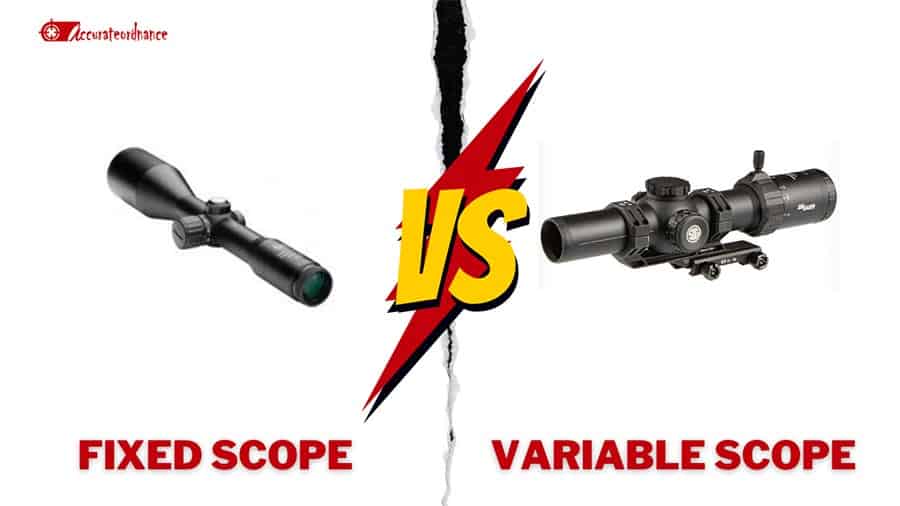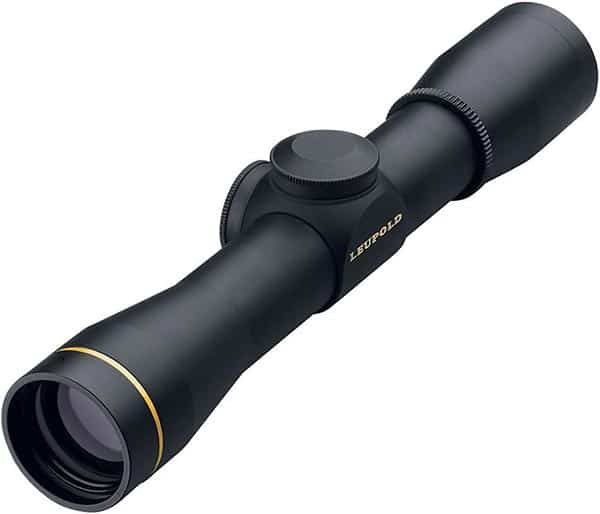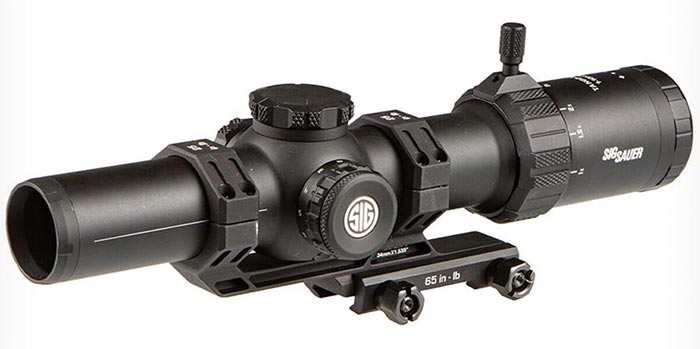A riflescope is an essential accessory for any hunting or shooting enthusiast, as it significantly improves accuracy and precision. When choosing a riflescope, one of the primary considerations is whether to opt for a fixed or variable powered scope. Fixed power scopes have a single magnification level, whereas variable power scopes allow for a range of magnification levels. Both types have advantages and disadvantages, and the choice between them depends on several factors, such as the rifle’s intended use and personal preference. This article will explore the difference between fixed and variable power rifle scope, their pros and cons, and factors to consider when selecting the right scope for your rifle.

Fixed Power Rifle Scope
A fixed power rifle scope is a type of scope that has a single and fixed magnification level that cannot be adjusted. A fixed scope has a low magnification, such as 4x, which means that the image is always four times larger than the naked eye. The magnification level of a fixed power scope is set at the factory and cannot be changed by the user. These scopes typically have a lower magnification range than variable power scopes and are ideal for shooting at close to medium-range distances. Fixed power rifle scopes are known for their simplicity, durability, and affordability. They are often preferred by hunters and shooters who do not require a wide range of magnification levels or need to make quick shots at targets that are relatively close.

Advantages of using fixed power rifle scopes
Fixed power riflescopes have some advantages over variable power scopes. Here are some advantages:
Simplicity
Fixed power riflescopes are easy to use. They have fewer controls and settings compared to variable power scopes. There is no need to adjust the magnification level, which makes it easier to acquire targets quickly. This simplicity also means that there are fewer parts that can malfunction or break, making them more reliable in the field. Additionally, because there are no moving parts to adjust, fixed power scopes hold their zero better, which means that they maintain their accuracy over time.
Durability
Fixed magnification scopes are built to be rugged and durable, which makes them ideal for hunting and shooting in harsh environments. Because there are fewer moving parts, fixed power scopes are less likely to be damaged by impacts or vibrations. They are also less likely to be affected by temperature changes or humidity, which can cause internal components to expand or contract and affect accuracy.
Affordability
Fixed power scopes are generally less expensive. This is because they are made with fewer features and require fewer parts during production, making them less expensive. This affordability makes fixed power scopes an excellent choice for beginners or those on a tight budget.
Speed and accuracy
Fixed magnification scopes are designed for specific shooting distances and are optimized for those ranges. Because there is no need to adjust the magnification, it is easier to acquire targets quickly and make accurate shots. Additionally, because there are no moving parts to adjust, the sight picture is more stable, which can help improve accuracy.
Weight and Size
A Fixed scope is often smaller and lighter than variable scope. This makes them more compact and easier to carry, particularly for hunters who need to hike long distances with their gear. The reduced size and weight also make them ideal for mounting on smaller rifles or for use in tight spaces, such as dense brush or thick forests.
Versatility
While fixed scopes are optimized for specific ranges, they can still be versatile in their own right. A fixed power scope can be an excellent choice for hunting or shooting at closer ranges, where a wide field of view is essential. Additionally, since fixed power scopes do not need to be adjusted, they are often quicker to use than variable power scopes, which can be crucial in situations where speed is of the essence.
Disadvantages of using fixed power rifle scopes
Although fixed power riflescopes offer several perks, they also have some disadvantages compared to variable power scopes. These disadvantages include:
Limited Magnification
The primary flaw of a fixed scope is that it has a single magnification level that cannot be adjusted. This means that the user is limited to the magnification level set by the factory, which may not be ideal for all shooting situations. For example, if a shooter that engages in long range shooting needs to take a shot, a fixed scope may not be able to provide the magnification needed to see the target clearly.
Limited Field of View
Fixed power scopes have a limited field of view compared to variable power scopes. This can make it harder to acquire targets, especially if the target is moving. A smaller field of view can also make it harder to track a moving target, which can be a disadvantage for hunters who are tracking game.
Less Flexibility
With a fixed power scope, the shooter cannot adjust the magnification level to compensate for different lighting conditions. This can be a disadvantage in low-light conditions or when shooting in bright sunlight.
Variable Power Rifle Scopes
A Variable powered scope is designed to provide flexibility and versatility to the user by allowing them to adjust the scope magnification level according to their shooting needs. The adjustment is made through a zoom ring located near the eyepiece of the scope, which controls the position of the lenses inside the scope. By turning the zoom ring, the shooter can change the magnification level and increase or decrease the image size, unlike when the target is viewed with the naked eye.

Variable power scopes can have different magnification ranges depending on their intended use. For example, a scope with a 3-9x magnification power may be suitable for hunting at close to medium range, while a scope with a 6-24x magnification power may be suitable for long range shooting or target shooting.
Variable power scopes are also available with different objective lens sizes, which affect the brightness and clarity of the image. A larger objective lens will allow more light to enter the scope, resulting in a brighter and clearer image, but it may also add weight and increase the size of the scope.
Advantages of using variable power rifle scopes
Variable scopes offer several advantages over fixed power scopes, including:
Versatility
Variable magnification scopes are more versatile than fixed power scopes, as they can be used in a wide range of shooting situations. The shooter can adapt to different ranges, lighting conditions, and shooting scenarios by adjusting the magnification level. This versatility makes variable power scopes popular among hunters and shooters who need to be prepared for different situations.
Flexibility
With a variable scope, the shooter can adjust the magnification level to match the target size and shooting distance. This makes it easier to take accurate shots at various distances, from close range to long range.
Larger Field of View
At lower magnification levels, variable scopes have a wider field of view than fixed power scopes. This makes it easier to acquire targets quickly, especially when shooting at moving targets.
Improved Accuracy
Variable scopes can help improve accuracy by allowing the shooter to magnify the target and aim more precisely. This is particularly useful when shooting at small or distant targets, where precision aiming is critical.
Better Low-Light Performance
Variable magnification scopes with larger objective lenses can provide better low-light performance than fixed power scopes. This is because a larger objective lens allows more light to enter the scope, making it easier to see the target in low-light conditions.
More Comfortable Shooting
Variable scopes can be more comfortable to shoot with, especially for extended periods. This is because the shooter can adjust the magnification level to reduce eye strain and fatigue, and to accommodate their shooting position.
Disadvantages of using variable power rifle scopes
While variable rifle scopes offer many advantages, they also have some disadvantages, including:
Cost
A Variable power scope is generally more expensive than a fixed scope, particularly those with high magnification ranges and large objective lenses. This can make them less accessible for some shooters, particularly those on a tight budget.
Complexity
Variable scopes can be more complex to use than fixed scopes, particularly for novice shooters. The shooter needs to be familiar with the scope’s adjustment mechanisms and understand how to use them effectively in different shooting situations.
Weight and Size
Variable scopes can be heavier and bulkier than fixed scopes, particularly those with larger objective lenses. This can make them more difficult to mount on a rifle and may affect the rifle’s balance and maneuverability.
Durability
Variable power scopes can be more fragile than fixed power scopes, particularly those with multiple moving parts. The scope’s adjustment mechanisms and lenses can be more susceptible to damage from impact or rough handling.
Comparison between fixed and variable power rifle scopes
Differences in Scope Magnification Range
The scope magnification range is the most obvious difference between fixed and variable power optics. Fixed scopes have a single magnification setting, while variable scopes allow shooters to change the magnification level to suit the shooting situation. Fixed power scopes typically have a lower magnification range, with common settings of 4x, 6x, or 8x. Variable power scopes can have a much wider magnification range, with some models offering a low magnification from 1-4x or 1-6x for short-range shooting, while others can reach 20x or more for long range shooting or target shooting.
Differences in Accuracy
Both fixed and variable power scopes can be accurate when properly mounted and zeroed. However, variable power scopes can offer more precision and accuracy due to their ability to adjust the magnification level to match the target size and distance. At higher magnification levels, variable scopes can help improve the shooter’s ability to aim precisely at small or distant targets.
Differences in Weight and Size
Fixed scopes are generally lighter and more compact than variable scopes, as they have fewer moving parts and a simpler design. This can make them more suitable for shooters who prefer a lightweight and streamlined setup, or for rifles that require a compact scope to maintain balance and maneuverability. Variable scopes, on the other hand, are usually heavier and bulkier due to their larger objective lenses and more complex construction.
Differences in Price
Fixed scopes are generally less expensive, as they have a simpler design and fewer features. Variable power scopes, particularly those with high magnification ranges, large objective lenses, or advanced features such as illuminated reticles or range-finding technology, can be more expensive. The price of a scope can also depend on the brand, quality of construction, and level of durability.
FFP vs SFP
Many hunters may prefer fixed scopes for their simplicity and durability; however, it is important to note that both first focal plane and second focal plane scopes can be effective for hunting and shooting. The choice between the two largely depends on the individual’s shooting preferences and needs.
If we want to talk about the focal plane, then it is more relevant in variable magnification scopes. Second focal plane scopes can offer several advantages for hunting, particularly at shorter ranges. Because the reticle size remains constant regardless of magnification, SFP scopes can be easier to use for quick shots or for shooting in low light conditions, as the reticle is more visible.
On the other hand, FFP scopes can offer greater precision for long-range shooting, as the reticle size adjusts with magnification, allowing for more accurate holdovers and ranging.

Mike Hardesty is a published freelance gun writer. He also possesses specialized expertise in rifle scopes With dozens of articles and reviews published in Pew Pew Tactical, Snipercountry.com, and TTAG (The Truth About Guns), Mike is considered a firearms expert. His special area of expertise is handguns.
Mike is a long-time shooter. He has been punching paper targets, taking deer and other game and shooting at competitions since about 1975. Other related pursuits include reloading and bullet casting. He currently reloads for over 10 calibers, both handgun and rifle. His reloads, particularly for 9mm, were in great demand during the height of the ammo shortage among family and friends. He donated hundreds of rounds to informal shooting sessions. He was quoted as saying “I do not sell my reloads but I sure will help my guys shoot ’em for free!”. He has a few cherished firearms that he has inherited or otherwise procured — those are his favorites.
He earned B.S. and M.S. degrees from Indiana State University in 1974-1975.
He’s a firearm experts and is the founder of mhardesty.com.
